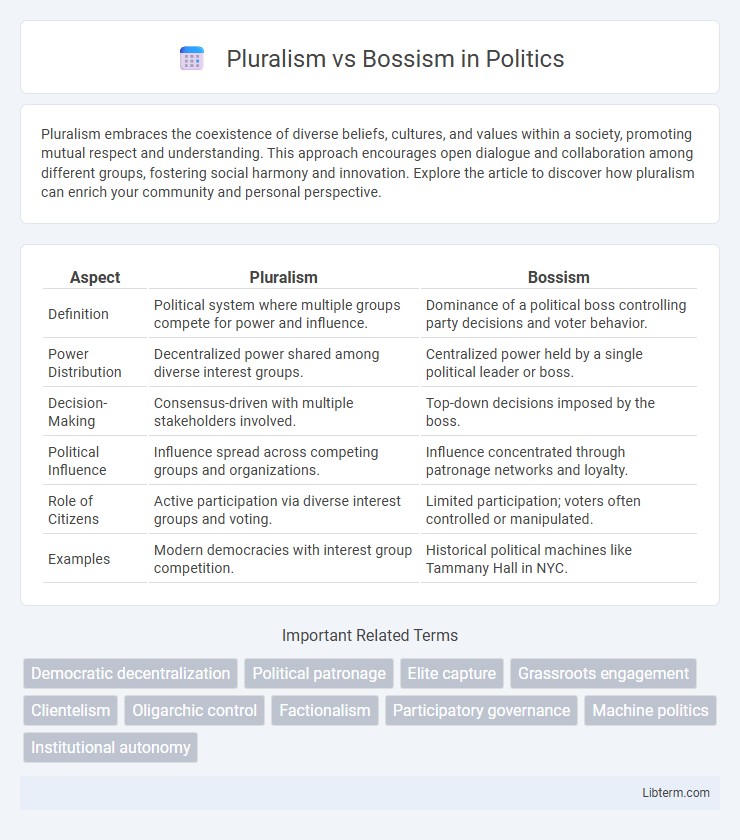Pluralism embraces the coexistence of diverse beliefs, cultures, and values within a society, promoting mutual respect and understanding. This approach encourages open dialogue and collaboration among different groups, fostering social harmony and innovation. Explore the article to discover how pluralism can enrich your community and personal perspective.
Table of Comparison
| Aspect | Pluralism | Bossism |
|---|---|---|
| Definition | Political system where multiple groups compete for power and influence. | Dominance of a political boss controlling party decisions and voter behavior. |
| Power Distribution | Decentralized power shared among diverse interest groups. | Centralized power held by a single political leader or boss. |
| Decision-Making | Consensus-driven with multiple stakeholders involved. | Top-down decisions imposed by the boss. |
| Political Influence | Influence spread across competing groups and organizations. | Influence concentrated through patronage networks and loyalty. |
| Role of Citizens | Active participation via diverse interest groups and voting. | Limited participation; voters often controlled or manipulated. |
| Examples | Modern democracies with interest group competition. | Historical political machines like Tammany Hall in NYC. |
Defining Pluralism and Bossism
Pluralism is a political theory that emphasizes the distribution of power across multiple groups, promoting diverse interests and preventing any single entity from dominating decision-making processes. Bossism refers to a political system dominated by a single leader or "boss" who exercises control through patronage, centralized authority, and often undemocratic means. Pluralism advocates for inclusive governance and competition, while bossism is characterized by hierarchical control and concentrated political power.
Historical Background of Pluralism and Bossism
Pluralism emerged in the early 20th century as a political theory emphasizing the diffusion of power among multiple interest groups, contrasting with the centralized control exemplified by bossism, a system prevalent in urban American politics from the late 19th to early 20th centuries. Bossism was characterized by political machines led by a single "boss" who controlled votes and government appointments through patronage and often corruption. The historical context of pluralism reflects a reaction against the autocratic tendencies of bossism, advocating for increased representation and competition among diverse societal groups to balance power.
Key Characteristics of Pluralism
Pluralism emphasizes the distribution of power among multiple interest groups, ensuring no single entity dominates decision-making processes. It fosters diverse participation, encouraging competition among groups to influence public policy, which enhances democratic representation. Key characteristics include decentralization of authority, negotiation, and compromise among stakeholders to achieve balanced governance.
Core Features of Bossism
Bossism centers on centralized political control where a single leader, or boss, wields significant power over local government and party decisions. This system relies heavily on patronage networks, clientelism, and hierarchical authority to maintain loyalty and influence. Unlike pluralism, which encourages diverse participation and decentralized power, bossism limits political competition through control of votes and resources.
Political Systems Embracing Pluralism
Political systems embracing pluralism prioritize diverse interest groups and encourage power distribution among multiple social, economic, and political organizations, fostering democratic engagement and preventing the centralization of authority. These systems contrast sharply with bossism, where power is often concentrated in a single leader or small elite controlling political decisions through patronage and coercion. By promoting competition and cooperation among varied stakeholders, pluralistic systems enhance policy responsiveness and protect individual rights within democratic governance.
Societies Dominated by Bossism
Societies dominated by bossism exhibit centralized control where political bosses maintain power through patronage networks and coercion, undermining democratic pluralism. In such systems, pluralism's diversity of interests and decentralized decision-making is replaced by hierarchical authority and limited political competition. This concentration of power often leads to corruption, reduced civic engagement, and weakened institutions essential for transparency and accountability.
Benefits of Pluralist Governance
Pluralist governance promotes diverse stakeholder engagement, fostering more inclusive decision-making that reflects a wider range of interests and perspectives. This approach enhances transparency and accountability by distributing power among multiple groups, reducing the risk of authoritarian control associated with bossism. Empirical studies show that pluralist systems encourage innovation and responsiveness, leading to more sustainable and equitable policy outcomes.
Risks and Consequences of Bossism
Bossism concentrates power in the hands of a single leader, risking the suppression of diverse viewpoints essential to a healthy democracy. This centralized control often leads to corruption, patronage, and the erosion of institutional checks and balances. Consequently, communities under bossism experience diminished political participation and reduced accountability, undermining their long-term social and economic development.
Pluralism vs Bossism in Modern Democracies
Pluralism in modern democracies promotes diverse interest groups competing for influence, ensuring power is dispersed and preventing authoritarian control. Bossism, however, centralizes authority in the hands of a single leader or political boss, often undermining democratic processes by manipulating political patronage and voter loyalty. The tension between pluralism and bossism shapes governance effectiveness, political accountability, and citizen representation in contemporary democratic societies.
Future Implications for Governance Models
Pluralism promotes diverse stakeholder engagement and decentralized decision-making, enhancing democratic resilience and adaptability in future governance models. Bossism centralizes power in dominant leaders, risking autocratic tendencies and reduced institutional accountability. Emerging governance trends favor pluralistic frameworks to balance power distribution, fostering transparency and participatory policymaking in complex, evolving political landscapes.
Pluralism Infographic

 libterm.com
libterm.com